![Lucas Meachem as Don Giovanni [Photo by Ken Howard courtesy of Santa Fe Opera]](http://www.operatoday.com/SantaFe_0274.gif)
17 Aug 2009
Mozart and Gluck — Mixed Results at Santa Fe
It is never easy to revive a success. Audiences will remember the first run of a show and consciously or not, compare a revival with earlier favorable impressions.
English Touring Opera are delighted to announce a season of lyric monodramas to tour nationally from October to December. The season features music for solo singer and piano by Argento, Britten, Tippett and Shostakovich with a bold and inventive approach to making opera during social distancing.
This tenth of ten Live from London concerts was in fact a recorded live performance from California. It was no less enjoyable for that, and it was also uplifting to learn that this wasn’t in fact the ‘last’ LfL event that we will be able to enjoy, courtesy of VOCES8 and their fellow vocal ensembles (more below …).
Ever since Wigmore Hall announced their superb series of autumn concerts, all streamed live and available free of charge, I’d been looking forward to this song recital by Ian Bostridge and Imogen Cooper.
The Sixteen continues its exploration of Henry Purcell’s Welcome Songs for Charles II. As with Robert King’s pioneering Purcell series begun over thirty years ago for Hyperion, Harry Christophers is recording two Welcome Songs per disc.
Although Stile Antico’s programme article for their Live from London recital introduced their selection from the many treasures of the English Renaissance in the context of the theological debates and upheavals of the Tudor and Elizabethan years, their performance was more evocative of private chamber music than of public liturgy.
In February this year, Albanian soprano Ermonela Jaho made a highly lauded debut recital at Wigmore Hall - a concert which both celebrated Opera Rara’s 50th anniversary and honoured the career of the Italian soprano Rosina Storchio (1872-1945), the star of verismo who created the title roles in Leoncavallo’s La bohème and Zazà, Mascagni’s Lodoletta and Puccini’s Madama Butterfly.
Evidently, face masks don’t stifle appreciative “Bravo!”s. And, reducing audience numbers doesn’t lower the volume of such acclamations. For, the audience at Wigmore Hall gave soprano Elizabeth Llewellyn and pianist Simon Lepper a greatly deserved warm reception and hearty response following this lunchtime recital of late-Romantic song.
Collapsology. Or, perhaps we should use the French word ‘Collapsologie’ because this is a transdisciplinary idea pretty much advocated by a series of French theorists - and apparently, mostly French theorists. It in essence focuses on the imminent collapse of modern society and all its layers - a series of escalating crises on a global scale: environmental, economic, geopolitical, governmental; the list is extensive.
For this week’s Live from London vocal recital we moved from the home of VOCES8, St Anne and St Agnes in the City of London, to Kings Place, where The Sixteen - who have been associate artists at the venue for some time - presented a programme of music and words bound together by the theme of ‘reflection’.
'Such is your divine Disposation that both you excellently understand, and royally entertaine the Exercise of Musicke.’
Amongst an avalanche of new Mahler recordings appearing at the moment (Das Lied von der Erde seems to be the most favoured, with three) this 1991 Mahler Second from the 2nd Kassel MahlerFest is one of the more interesting releases.
‘And there was war in heaven: Michael and his angels fought against the dragon; and the dragon fought and his angels, And prevailed not; neither was their place found any more in heaven … that old serpent … Satan, which deceiveth the whole world: he was cast out into the earth, and his angels were cast out with him.’
If there is one myth, it seems believed by some people today, that probably needs shattering it is that post-war recordings or performances of Wagner operas were always of exceptional quality. This 1949 Hamburg Tristan und Isolde is one of those recordings - though quite who is to blame for its many problems takes quite some unearthing.
There was never any doubt that the fifth of the twelve Met Stars Live in Concert broadcasts was going to be a palpably intense and vivid event, as well as a musically stunning and theatrically enervating experience.
‘Love’ was the theme for this Live from London performance by Apollo5. Given the complexity and diversity of that human emotion, and Apollo5’s reputation for versatility and diverse repertoire, ranging from Renaissance choral music to jazz, from contemporary classical works to popular song, it was no surprise that their programme spanned 500 years and several musical styles.
The Academy of St Martin in the Fields have titled their autumn series of eight concerts - which are taking place at 5pm and 7.30pm on two Saturdays each month at their home venue in Trafalgar Square, and being filmed for streaming the following Thursday - ‘re:connect’.
The London Symphony Orchestra opened their Autumn 2020 season with a homage to Oliver Knussen, who died at the age of 66 in July 2018. The programme traced a national musical lineage through the twentieth century, from Britten to Knussen, on to Mark-Anthony Turnage, and entwining the LSO and Rattle too.
With the Live from London digital vocal festival entering the second half of the series, the festival’s host, VOCES8, returned to their home at St Annes and St Agnes in the City of London to present a sequence of ‘Choral Dances’ - vocal music inspired by dance, embracing diverse genres from the Renaissance madrigal to swing jazz.
Just a few unison string wriggles from the opening of Mozart’s overture to Le nozze di Figaro are enough to make any opera-lover perch on the edge of their seat, in excited anticipation of the drama in music to come, so there could be no other curtain-raiser for this Gala Concert at the Royal Opera House, the latest instalment from ‘their House’ to ‘our houses’.
"Before the ending of the day, creator of all things, we pray that, with your accustomed mercy, you may watch over us."
![Lucas Meachem as Don Giovanni [Photo by Ken Howard courtesy of Santa Fe Opera]](http://www.operatoday.com/SantaFe_0274.gif)
It is never easy to revive a success. Audiences will remember the first run of a show and consciously or not, compare a revival with earlier favorable impressions.
So it was with Santa Fe’s current Don Giovanni, which premiered in 2004 under the musical direction of Alan Gilbert with a stylish mise-en-scène and direction by the team of Zinn/Rader-Shieber, and a thoroughly first-rate cast.
This summer Don Giovanni is sharply different, and the problem starts with musical direction of Lawrence Renes, a young conductor from the Netherlands, who does not seem ready to conduct Mozart’s masterpiece. Success was also attenuated by a young lightweight cast, which had little chemistry as an ensemble, and few adequate voices. I am not one to linger over negatives, but some points need to be made. Renes was all motion and nervous energy on the podium, giving cues where none were needed, ignoring shape and elegance, elements that virtually define Don Giovanni. He spent much time shushing the orchestra, probably in favor of a small-voiced cast; too much energy was lost in the process. His tempo for the Champagne Aria was excellent, likewise the Act II Serenade; but like much of the rest of the score, he treated them as isolated events. Missing were both over-all sweep and sufficiently defined details of inner voices of the orchestra that create the aural excitement of this seminal Mozart. Bottom line: de-energized, boring music making, in spite of much fuss and feathers.
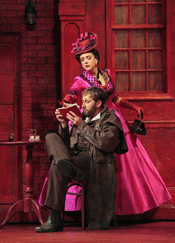 Susanna Phillips (Donna Elvira) & Matthew Rose (Leporello)
Susanna Phillips (Donna Elvira) & Matthew Rose (Leporello)
This translated over the footlights to the stage, where little style and at
times almost amateurish performances were evident. Lucas Meachem cast as a
swaggering Don, did not swagger — histrionically or vocally. He has a
pleasant, if mild musical comedy baritone that most of the time could not be
heard; he offered minimal physical style, and little ‘edge’ for a
man who likes to conquer women “just for the sake of the list,” (in
Santa Fe’s translation): one was much puzzled that he was cast by Santa
Fe. The same was true of the vocally lightweight, histrionically shallow
Leporello of Matthew Rose, a young singer not yet suited to the big leagues, at
least not on this occasion.
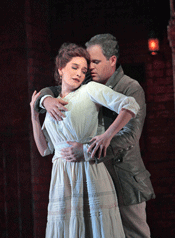 Kate Lindsey (Zerlina) and Corey McKern (Masetto)
Kate Lindsey (Zerlina) and Corey McKern (Masetto)
The pretty Zerlina of Kate Lindsey was too slight of voice and something of
a vamp, in a role that usually is more demure. In “Vedrai carino”
she began her aria of consolation far from the battered Masetto, and slithered
slowly, erotically across the wide stage, exposing and caressing her legs in
what amounted to a vulgar re-seduction of her battered groom. The aria was all
about her, not about comfort for him. This was likely not Lindsey’s doing
— the discredit belonging to director Chas. Rader-Shieber, who seemed
often inattentive to details in his revival production. It should be noted the
Masetto of Corey McKern was well-enough sung and played, one of the stronger
performances among lead singers.
Charles Workman was a competent Ottavio — his voice even-toned and pleasant, but as a player he was Clark Kent without benefit of telephone booth. His movements were stiff and clichéd, his two arias no more than well-routined.
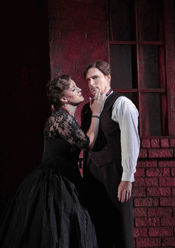 Elza van den Heever (Donna Anna) and Charles Workman (Don Ottavio)
Elza van den Heever (Donna Anna) and Charles Workman (Don Ottavio)
The news gets better with Donna Elvira and Donna Anna. Susanna Phillips is a
proven good thing as a Mozart singer and she again made her marks with the
opera’s most interesting character, the oft-betrayed Elvira.
Phillips’ generous warm soprano easily dispatched the coloratura demands
of the role, while her lyric singing was full-bodied and projected well.
Perhaps not the greatest actor, she nonetheless was in the spirit of her role
and commanded her music and all her scenes; most important, she could be heard!
Elza van den Heever, the South African-born, San Francisco-trained ‘baby
dramatic soprano’ (as she is called), turned in an intense, driven and
rather unsympathetic Donna Anna — often powerful, with a hard-edged
bright soprano that mined every note Mozart gave her. But the voice is
dynamically uneven, swinging from loud to soft, with awkward transitions. Her
tonal quality can be steely, and is rarely warm or especially attractive, yet
with further refinement she could be a useful singer in the right roles, as she
seems to possess good basic talent. At present van den Heever is house soprano
in a major German company, an experience that may be beneficial. She is worth
keeping an eye on.
Over-all the red-tinted production, which offers engaging play among many hues and tones of crimson — bright, outraged fuchsia for Elvira, black figurations with somber maroon for Anna — even red tinted trees, walls and windows, still surprises and offers favorable flow and good logistics. With improved musical direction, and a more mature cast, Santa Fe’s Don might recapture former glories.
Christophe Willibald Gluck’s 1776 French-language version of Alceste, the story of a self-sacrificing Thessalonian queen who would give her life for her husband’s, rises or falls on two factors: Dancing and strong dramatic soprano singing of the title role. Santa Fe had both.
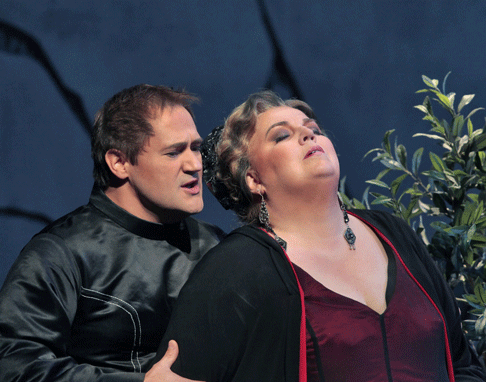 Paul Groves (Admète) & Christine Brewer (Alceste)
Paul Groves (Admète) & Christine Brewer (Alceste)
As the queen, Christine Brewer sang with powerful, often glowing tone, commanding a strong top register with unique richness in the mid and lower ranges — qualities that make an ideal voice for a part that is both feminine and heroic. As might be imagined, Alceste is not easy to portray on stage, and Gluck was not, frankly, much of a dramatist, though among the greatest of musicians and composers. Act I is largely lament for the dying king; Act II is lamentation for the dying queen, and Act III is about both, then with a happy quick ending due to the beneficent intervention of legendary strongman Hercules and the god Apollo. The story is a compound of ancient Greek myth and legends, later made into a tragedy by Euripides, then further compounded into a drama for 18th-Century audiences by Gluck’s librettist Calzabigi. It is the work of many hands and seems it. Fortunately the glorious music unifies all into a musical whole, if not dramatic success — it is simply too repetitious.
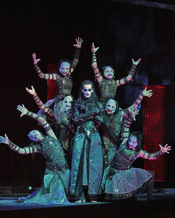 Tom Corbeil (The Infernal God)
Tom Corbeil (The Infernal God)
Since Alceste is a stand-about opera, what do you do but dance! Santa Fe
brought in a wizardly choreographer and solo dancer from Spain, one Ana Yepes,
a tiny woman who twirls and whirls onto the stage with a troupe of seven
dancers, and also some choreographed chorus members and even a dancing tenor or
two, and stirs up a delightful mélange of movement, motion and gesture,
representing — well, whatever you want: the divinities of Hell, the local
folk observing the antics of royalty and gods, the moods of the characters and
their music, even at one point a little swaying audience of dancing figures for
the second verse of Alceste’s mighty defiance aria, “Divinités du
Styx,” sung with thrilling power and musical accent by Mme. Brewer. Many
a singer would not have allowed that distraction during her principal aria.
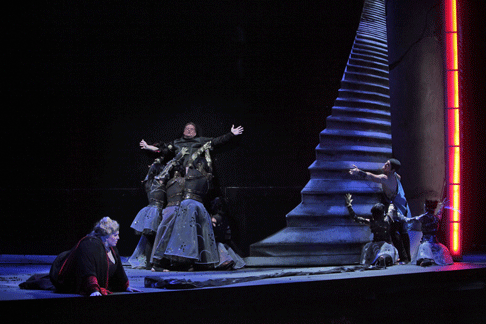 Christine Brewer (Alceste), Paul Groves (Admète) & Wayne Tigges (Hercule)
Christine Brewer (Alceste), Paul Groves (Admète) & Wayne Tigges (Hercule)
What did it all look like? It is not easy to say — the Queen and her King Admète (handsome, musically stylish tenor Paul Groves), were in either stately robes or classic Greek attire; the chorus in non-descript low colored robes, save for the ones that danced who had a touch of color, and the dancers themselves in what I would call ‘comic-book gothic,’ close fitting garb, though another observer offered terms such as ‘Buck Rogers’ or ‘outer-space.’ Apollo was in gold, a bully Hercule showed a lot of skin, and stately Mme. Brewer, fortunately, kept her dignity while grieving mightily for her ailing husband in Act I, and herself in Act II. Happily in the final scene she showed us a beautiful radiant smile.
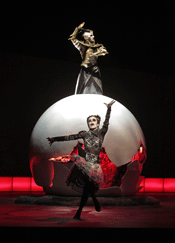 Matthew Morris (Apollo) & Ana Yepes (Dancer)
Matthew Morris (Apollo) & Ana Yepes (Dancer)
The imaginative stage director Francisco Negrin had the audience looking
into what could have been the open end of a stage-sized cornucopia, or perhaps
a horn of plenty, which curved into to a vanishing point and was sometimes
blue, sometimes white — impressionistic and useful as generalized
background, with a large ovoid shape, cracked open in the middle and glowing
red therefrom, that appeared now and then. An oracular site? The gate to Hell?
Google is no help! What really counted was the emotional effect of the music
and singing, and here the proponents were strong and convincing. One will not
soon forget the beauty and expressivity of the dramatic soprano’s tones
in her various arias; nor of the well-modulated chorus; or the
orchestra’s elegant playing, so balanced and refined under conductor
Kenneth Montgomery, Santa Fe’s long-time and admirable resident
classicist. A beautiful, if basically boring opera, well achieved.
J. A. Van Sant © 2009